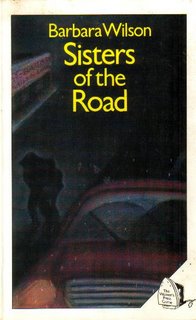 First published 1987; cover shown is the Women's Press (UK) first edition softcover. Cover art by Deborah Brown.
First published 1987; cover shown is the Women's Press (UK) first edition softcover. Cover art by Deborah Brown.Radical feminist Pam Nilsen works at a left-wing Seattle printing shop by day and tries to sort out her confusing lesbian relationships by night. After farewelling her twin sister at the airport (Penny is bound for Nicaragua to help with the coffee bean harvest), Pam encounters two teenage girls on the drive home and offers them a lift. Struggling to drive her decrepit Volvo through a snowstorm, Pam is shocked to discover that one of the girls is unconscious, bleeding all over the backseat from a shocking head wound.
After the fatally wounded Rosalie is taken to hospital, Trish, the second teenager, does a runner with Pam's wallet and the days takings from the printing shop. She returns the next day however, tracking Pam down to her workplace. Pam senses the heavily made-up, big-breasted Trish knows more than she's saying about Rosalie's death. Trish is only 15 years old: a prostitute, drug addict and runaway.
Trish stays at Pam's place overnight, but has left when Pam arrives home the next afternoon. Pam, who tried her hand as an amateur sleuth in Wilson's Murder in the Collective, finds herself unable to let Trish disappear back into the hopeless world she came from, and begins investigating her background, searching for clues as to why a bright teenager like Trish is selling her body for drugs - and why Rosalie was murdered.
Pam visits social workers, talks to streetkids and prostitutes, and tracks down Trish's family. She discovers that Trish's father molested her when she was six years old; Trish's stepfather beat her; Trish's mother turned her back on her; Trish's stepbrother Wayne is pimping her. Now she's missing, and Pam has to find her before she ends up dead like Rosalie.
This was an interesting crime novel, with succinct, bite-size chapters and an unexpected climax; it was also my first sample of lesbian detective fiction. The focus on prostitution made me stop a number of times and think about my own opinions on the subject. I did think that some of the many metaphors Wilson used were a little over the top, such as "The night was cold and starry with a moon like a saucer of frozen milk low on the horizon", and "The sun came out at intervals, like a pebble someone kept tossing up into the sky."
Barbara Wilson (b. 1950 and now known as Barbara Sjoholm) is an American writer and editor, who has written several successful crime series with lesbian detectives. In 1976 she co-founded the feminist Seal Press in Seattle. The press has published such bestsellers as Wilson's own novels, The Black Women's Health Book and the radical feminist classic Adiós Barbie.
No comments:
Post a Comment